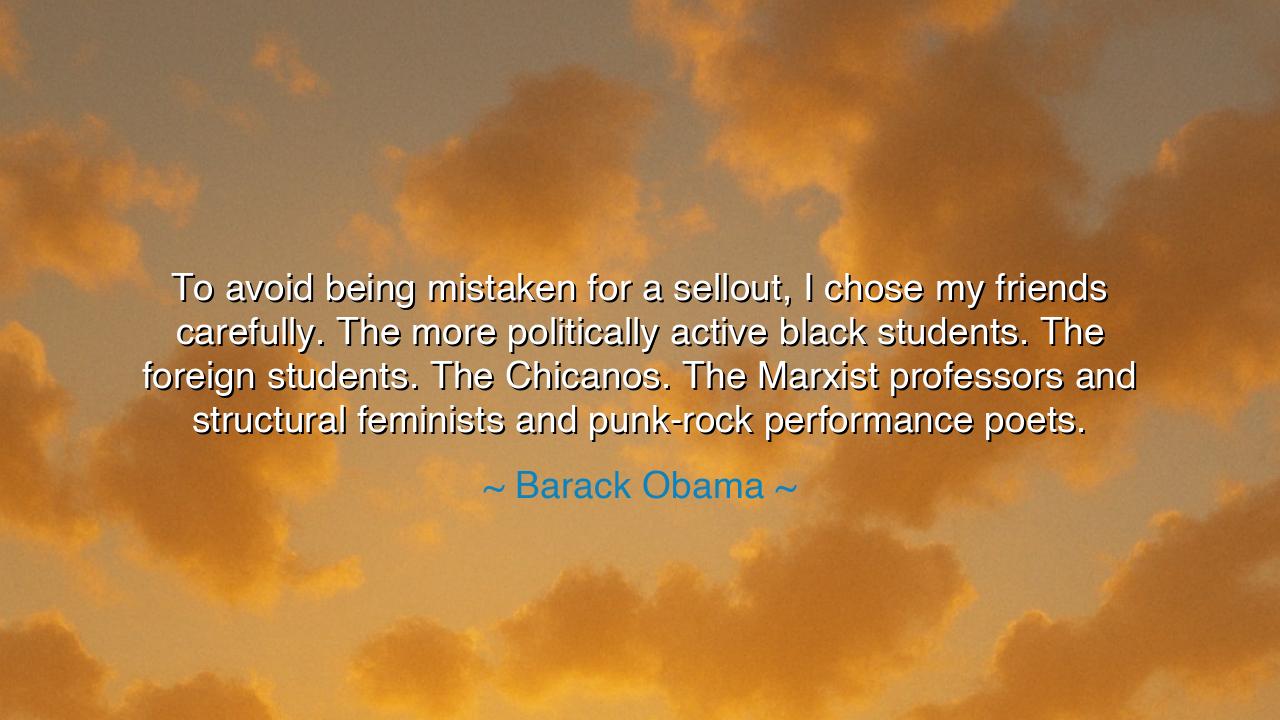
To avoid being mistaken for a sellout, I chose my friends
To avoid being mistaken for a sellout, I chose my friends carefully. The more politically active black students. The foreign students. The Chicanos. The Marxist professors and structural feminists and punk-rock performance poets.






“To avoid being mistaken for a sellout, I chose my friends carefully. The more politically active black students. The foreign students. The Chicanos. The Marxist professors and structural feminists and punk-rock performance poets.”
Thus spoke Barack Obama, long before he became a leader of nations, when he was still a young man searching for the meaning of identity in a divided world. These words, drawn from his memoir Dreams from My Father, reflect the restlessness of youth and the deep yearning to belong. In them we see the struggle not of a politician, but of a soul striving to reconcile the fragments of itself—the child of many worlds, walking the narrow path between them. Obama’s confession reveals a truth ancient and universal: that every human being, before he finds his calling, must first find his tribe.
In this passage, Obama speaks as one who has come of age under the shadow of history. As a man of mixed heritage, neither fully embraced by one world nor the other, he felt the gaze of others asking: Who are you? Whose side are you on? To escape being branded a sellout, he aligned himself with those who stood against conformity—the rebels, the activists, the thinkers who questioned the world’s injustice. He sought in them not only solidarity, but authenticity. For he knew that to survive as a man of color in a world shaped by power and prejudice, one must build an identity rooted not in acceptance, but in conviction.
Yet there is more here than the story of one man. Obama’s words speak to a timeless struggle within the human heart—the need to belong without losing the self. Each of us, in our youth, feels the pull of tribes and ideologies that promise belonging. We choose our companions not merely for friendship, but for reflection: we seek in others a mirror of the person we hope to become. And yet, as Obama would later learn, true integrity is not found in allegiance to any faction, but in the courage to stand alone when truth demands it. The careful choosing of friends is not hypocrisy—it is the forging of a self.
Consider the story of Siddhartha Gautama, who would one day become the Buddha. Born a prince, he turned away from the luxury of his palace to walk among ascetics, philosophers, and seekers of wisdom. He chose his companions carefully, as Obama did, not for comfort but for meaning. Yet, in time, he learned that truth could not be found solely in extremes—neither in indulgence nor denial, neither in belonging nor in isolation. Like Obama, he walked the path from identity toward universality, from self-definition to self-realization. Both men, in their different ages, discovered that who we walk with shapes the journey, but the destination must be found within.
Obama’s quote also reflects the fire of youth—the desire to prove one’s authenticity in a world of masks. To be called a sellout is to be accused of betrayal: of one’s race, one’s principles, one’s truth. And so he chose those who resisted the mainstream, those whose very existence was an act of defiance. The Marxist professors and feminists, the Chicanos and foreign students, all represented voices that stood outside the corridors of power. They were his teachers in rebellion, his companions in awakening. But as life unfolded, he learned that strength does not lie merely in opposition, but in reconciliation—that to build bridges, one must sometimes step beyond the safety of one’s circle.
The wisdom of this passage, then, is twofold: first, that we must choose our companions with intention, for the company we keep molds our character; and second, that our choices must evolve as we do. It is noble to seek belonging among those who share our struggle, but it is greater still to transcend the need for belonging altogether, to act from the still center of truth. Obama’s journey from self-consciousness to self-assurance mirrors the path of every seeker who learns that authenticity comes not from the approval of others, but from the harmony between one’s actions and one’s conscience.
So, O reader, take heed of this teaching: choose your friends wisely, especially when you are young and the world seeks to name you. Walk with those who awaken your mind and challenge your soul, but do not bind yourself to any circle so tightly that it blinds you to the light beyond. Remember that friendship is both a refuge and a mirror. It can reveal who you are—or conceal who you might become. The true test of friendship is not whether it shields you from judgment, but whether it strengthens your courage to walk in truth.
Thus, the young Obama’s reflection becomes a lesson for all generations: that in the forging of identity, every man must first find his tribe, but the wise will one day rise beyond tribe to embrace humanity itself. Authenticity, not acceptance, is the foundation of peace. And though we may begin by choosing friends carefully to shape who we are, we must end by loving all—freely, without fear of being mistaken for anything but what we truly are: children of one human family, walking beneath the same sky.






AAdministratorAdministrator
Welcome, honored guests. Please leave a comment, we will respond soon